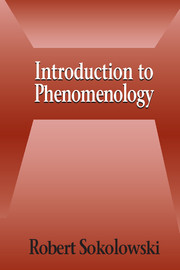Book contents
- Frontmatter
- Contents
- Acknowledgments
- Introduction
- 1 What Is Intentionality, and Why Is It Important?
- 2 Perception of a Cube as a Paradigm of Conscious Experience
- 3 Three Formal Structures in Phenomenology
- 4 An Initial Statement of What Phenomenology Is
- 5 Perception, Memory, and Imagination
- 6 Words, Pictures, and Symbols
- 7 Categorial Intentions and Objects
- 8 Phenomenology of the Self
- 9 Temporality
- 10 The Life World and Intersubjectivity
- 11 Reason, Truth, and Evidence
- 12 Eidetic Intuition
- 13 Phenomenology Defined
- 14 Phenomenology in the Present Historical Context
- Appendix: Phenomenology in the Last One Hundred Years
- Select Bibliography
- Index
12 - Eidetic Intuition
Published online by Cambridge University Press: 05 June 2012
- Frontmatter
- Contents
- Acknowledgments
- Introduction
- 1 What Is Intentionality, and Why Is It Important?
- 2 Perception of a Cube as a Paradigm of Conscious Experience
- 3 Three Formal Structures in Phenomenology
- 4 An Initial Statement of What Phenomenology Is
- 5 Perception, Memory, and Imagination
- 6 Words, Pictures, and Symbols
- 7 Categorial Intentions and Objects
- 8 Phenomenology of the Self
- 9 Temporality
- 10 The Life World and Intersubjectivity
- 11 Reason, Truth, and Evidence
- 12 Eidetic Intuition
- 13 Phenomenology Defined
- 14 Phenomenology in the Present Historical Context
- Appendix: Phenomenology in the Last One Hundred Years
- Select Bibliography
- Index
Summary
In our experience, we deal with more than individuals and groups. We also have insight into the essence of things. For example, we can see not only that all the human beings we have encountered are capable of speech, but that the ability to use language is necessarily and universally a part of being human. It is part of the essence of man; we could not be human without it. We can see not only that material objects interact causally with their surroundings, but that they must do so; without the possibility of such interaction, a material object would not be what it is. Likewise, a perceived object's being an identity in a manifold of sides, aspects, and profiles is universal and necessary, and we can see that it is so. Essences are evidenced to us.
Insight into an essence is called eidetic intuition, because it is the grasp of an eidos or a form. We can intuit, or make present to ourselves, not only individuals with their features, but also the essences that things have. Eidetic intuition is a special kind of intentionality with a structure of its own. Phenomenology offers an analysis of this intentionality; it describes how we can intuit an essence.
ANALYSIS OF EIDETIC INTUITION
Like all intentionalities, eidetic intuition is an identity synthesis. Through it we recognize an identity within manifolds of appearance, but the identity and the manifolds are different from the kind that occur when we intuit individual things.
- Type
- Chapter
- Information
- Introduction to Phenomenology , pp. 177 - 184Publisher: Cambridge University PressPrint publication year: 1999



